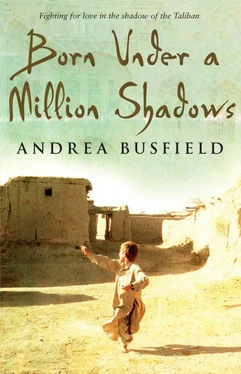As we traveled to Shinwar, Ismerai tried to take our mind off roadside bombs and “other incidents” by pointing out the places where people had been blown up in the past. “This is where the mujahideen ambushed a Russian convoy toward the end of the jihad,” he said as we came out of Kabul and into the mountains. “Here there was a mighty battle that lasted a full week… here we had some of our best sniper positions… here we dug tunnels into the hills to escape from the Communists…” He then pointed out the death sites of fallen friends and forgotten heroes and basically sent us all into a bit of a depression.
As we slipped down into Nangarhar and on into Shinwar, the sun burned hot through our windows, making it difficult to talk without completely exhausting ourselves, so we fell into our own thoughts and daydreams until we arrived at Haji Khan’s home.
I’d never been to his Shinwar compound before, and though it was smaller than his place in Jalalabad, it was much nicer—more like a home than a palace. Of course it was a home filled with guards carrying guns, but they were more in the shadows than at the other place.
As the Toyota came to a stop in the driveway, Georgie was the first out. Bending to the ground to stretch out her back, she then lifted her arms to the sky, holding them there for a moment, high above her head, as if she was feeling the air between her fingers.
“God, I love this place,” she said to no one, sighing. Then, turning to me, she added, “You know, Fawad, this is where I first fell in love with Afghanistan.”
“And with Haji Khan,” I added for her.
“Yes,” she accepted, “with Haji Khan too.”
I smiled, because this was important. If Georgie was to make the right decision about her future, she needed to be reminded of everything she loved, not of all the other things that had come to make her sad.
Ismerai came over to join us.
“Go sit on the carpet, and I’ll join you in a minute,” he said. “I’ve just got a couple of phone calls to make.”
Georgie and I nodded, and we walked over to a red carpet that was lying under a huge tree. The air was much cooler under the leaves, and above our heads birds sang to us. Life just didn’t get any better than this.
“It would be sad never to see this place again,” I said to Georgie as she kicked off her sandals and sat back to stretch out her legs.
“Yes, it would,” she admitted. “You know, it’s a shame that so many people don’t get to experience days like this.”
“Yes, it is,” I agreed. Then, after thinking about it a bit more, I asked, “Why?”
Georgie smiled. “Well, there’s so much more to your country than war, as you can see, but unfortunately we rarely get to hear about it. I don’t think people get the full picture—about what Afghanistan is like, and what Afghans are like.”
“Yes, it is pretty good here,” I said, “as long as you’re not hungry.”
“Or no one’s trying to kill you.”
“Or you don’t get sold by your family.”
“Or you don’t lack electricity or clean water.”
“Or… or…” I was struggling now. “Or you don’t get your head blown off by a gas cooker.”
Georgie put her chin to her chest and looked at me over her sunglasses.
“It happened once, to a woman in our street,” I explained.
“Oh,” Georgie said, lifting her head back up to the sun that winked at us through the leaves, “well then, you’re right. It’s a pretty good country if you don’t get your head blown off.”
“Or your legs,” I added. “There are still a lot of land mines.”
“Or your legs,” Georgie agreed.
“Actually, what is so good about Afghanistan?” I asked, and we both started laughing.
“Okay,” Georgie said, stopping first. “For one, I’ve never lived anywhere where the sky is so blue it can leave you speechless.”
“It can get very blue,” I agreed.
“And though life is hard here, much harder than we can imagine living in our nice house in Wazir Akbar Khan, there is also kindness hiding behind the walls of these houses, and love.”
“What do you mean?”
“Okay, let me think how to explain. It’s like the books about your country. Most of them would have you believe that Afghanistan is a land of noble savages, heroic men who kill at the first provocation, and in some ways maybe they are right. There is a quick anger within you all and a brutality that is sometimes shocking to us, but mainly the Afghans I’ve been lucky enough to encounter have been simple people with good hearts who are just trying to survive.”
“I wouldn’t call Haji Khan simple.”
“Well, no, you’re right, again,” Georgie admitted, “but although he’s not poor, he still has a good heart. Khalid means well, I know that, it’s just that sometimes… Well, hey, come on, let’s not even go there.”
Georgie reached for her cigarettes, and as she suggested, I decided “not to go there” just in case “there” was the place where all the bad memories sat waiting.
As Georgie blew the smoke from her mouth, Ismerai returned. His phone was closed, and he had a smile on his face.
“Come,” he said, struggling a little for breath. “We’ve got something to show you.”
Zalmai drove us to a place about fifteen minutes away from Haji Khan’s house. Bouncing off the main track, we came to a stop outside a half-finished building where workmen were still busy building walls and moving dirt around in wheel-barrows.
As we stepped out into the air, Haji Khan appeared from the house talking to a man holding a large notebook. When he saw us, he shook hands with the man and walked over, with a smile on his face. He certainly looked a lot happier than the last time I’d seen him, and as usual he was dressed in the finest salwar kameez of pale blue with a gray waistcoat matching the color of his pakol .
I decided that if I ever got bored of wearing jeans, I would definitely find out who his tailor was.
“So, what do you think?” Haji Khan asked when he reached us. He spoke in English, and I guessed it was to stop the workmen from listening to his conversation.
“It’s a beautiful area,” Georgie said. “Are you building another house then?”
“Yes, I am building a new house,” he said, “but this house is for you. If you choose to accept it or not, this is also a matter for you.”
I was pretty amazed by his words, and I felt my mouth drop open with the weight of a million questions wanting to spill out but not being allowed to.
Georgie said nothing.
“Look,” Haji Khan continued, “come inside and let me show you.”
Before Georgie could refuse him he walked away. So we followed.
Stepping over bags of sand, we entered the house and walked into a square-shaped hall that was cement gray all around, with bits of wire hanging out of the walls. It wasn’t what you might call “pretty.”
“This will be the seating area,” Haji Khan said, looking at Georgie and waving his hand around the room. “It will be for your guests when they come. When it is finished, the walls will be a very beautiful green—this is my thinking—like the meadows of Shinwar, so that when it is cold you will always have spring.”
Without waiting for Georgie to react, Haji Khan moved to the left where two holes were waiting for doors.
“This room is the kitchen,” he explained, “and the other room is where your guests sleep. I am making also a very beautiful toilet place, side by side—what is it you say?”
“En suite,” replied Georgie.
“Yes”—Haji Khan nodded—“yes, in sweet. I think this is a good idea. Very Europe. Come.”
Haji Khan crossed the hall to where a staircase was being made between the ground floor and the top floor. It wasn’t finished yet, and a ladder leaned against the balcony above so the workmen could get up and down.
Читать дальше












